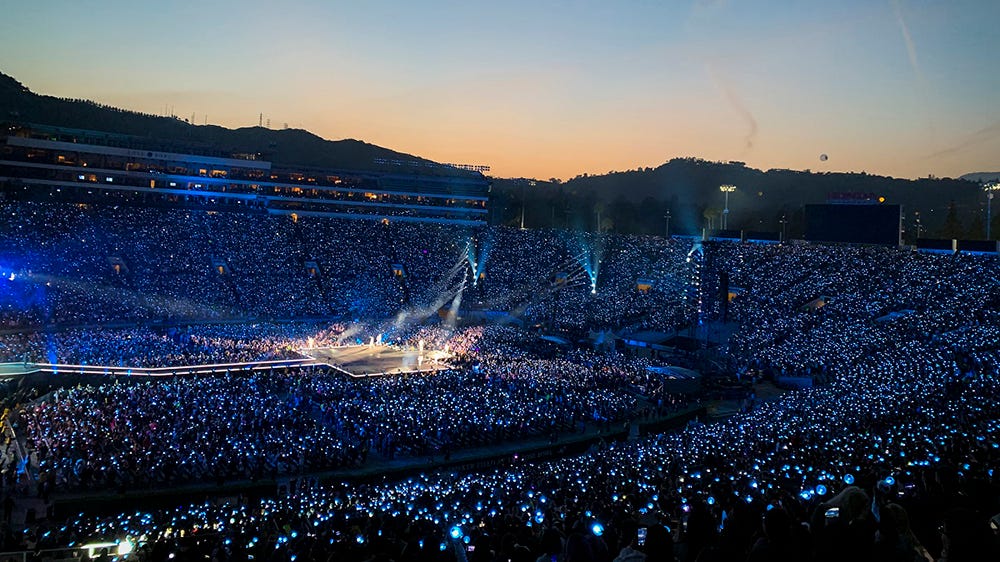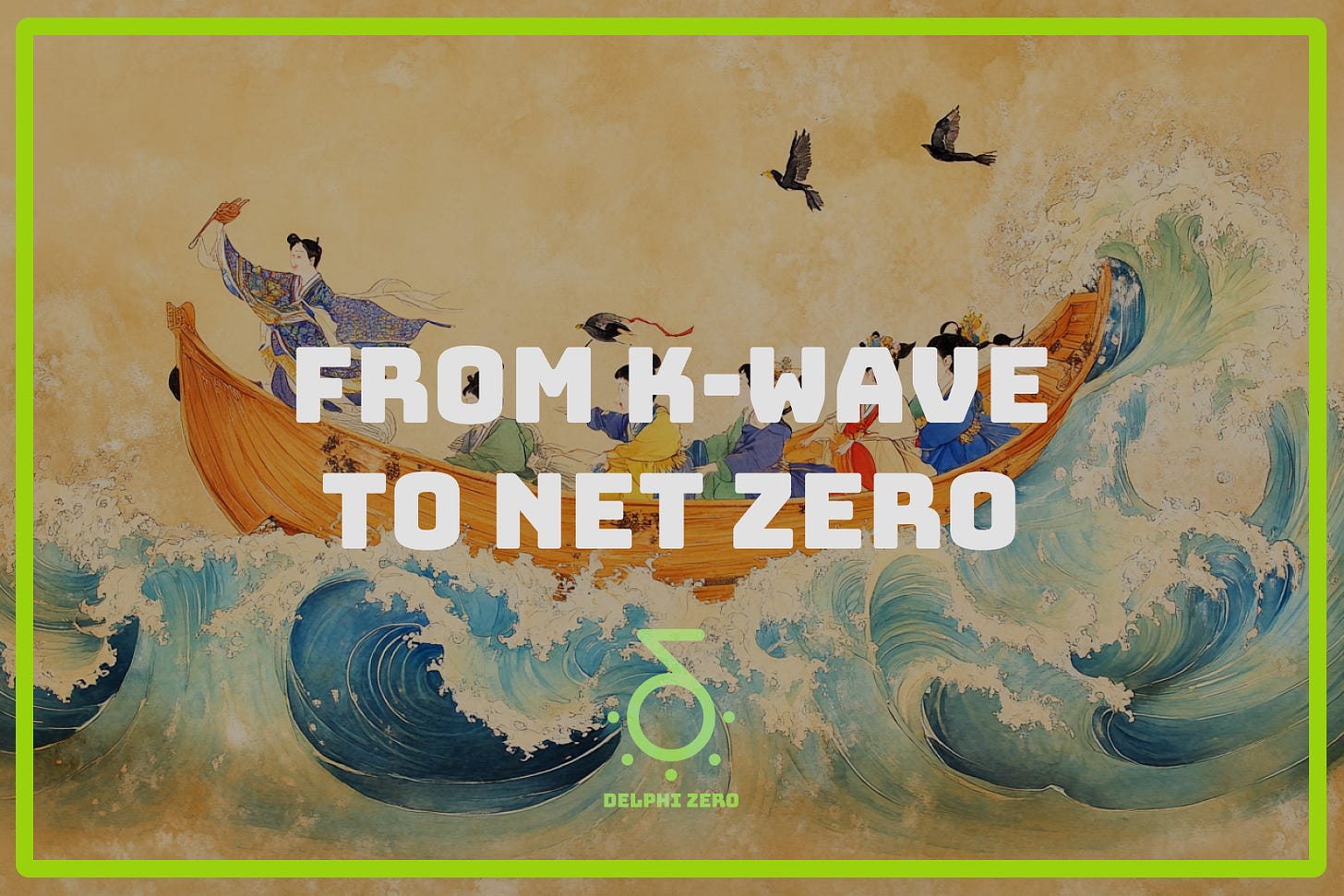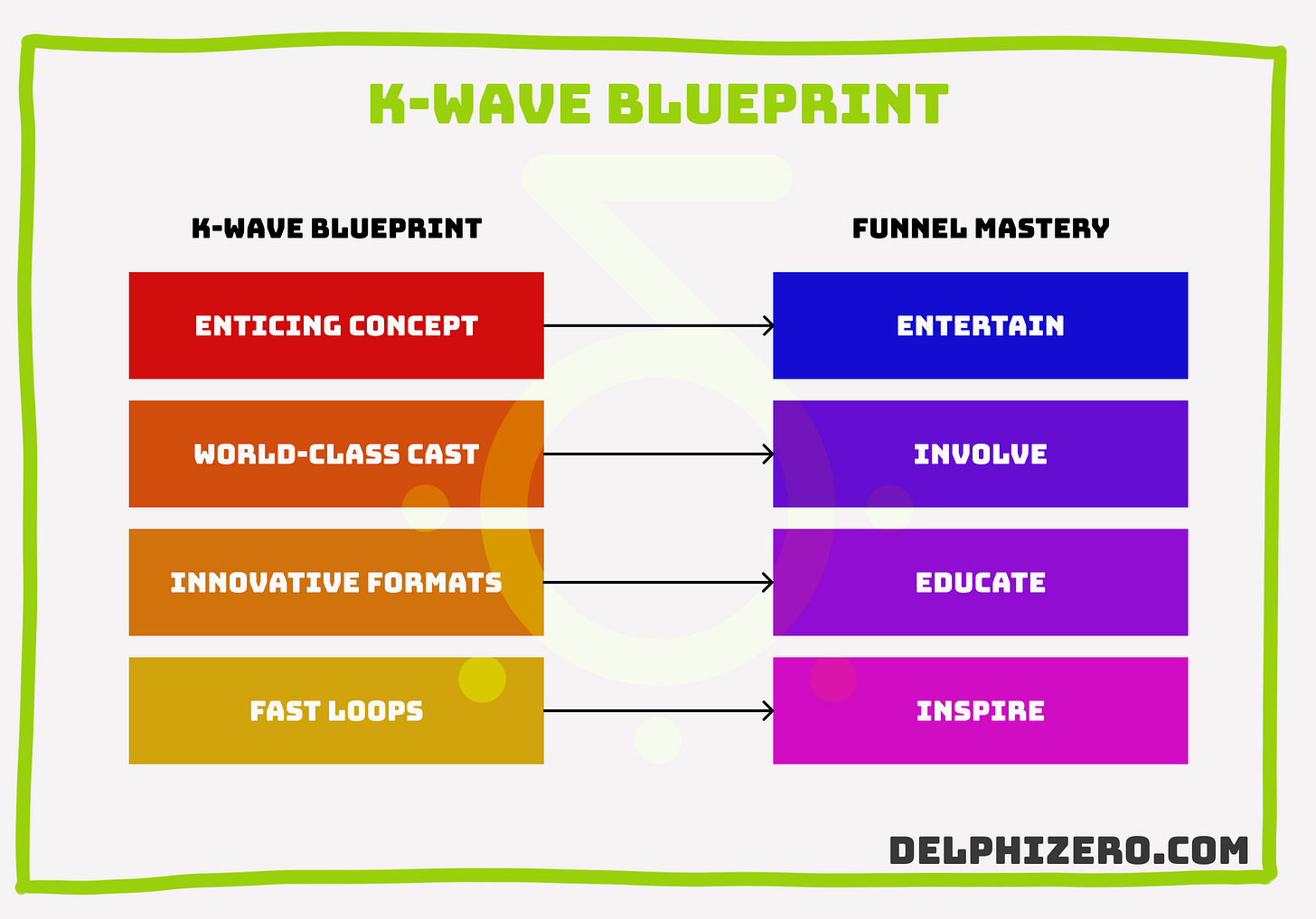From K-Wave to Net Zero
What Korean Entertainment Teaches Us About Climate Storytelling
👋 Hej to 2,899 climate buddies 2,899명의 기후 친구들 안녕하세요 🌳
Climate has a story problem.
Delphi Zero is a consultancy and newsletter dealing with the exciting world of climate tech. One story at a time.
📧 If you are opening this essay in your email inbox, I recommend to click on the title of this piece to enjoy the full-length version in the browser.
Wow! Just wow. I rediscovered my love for food.
How? I finished yet another Netflix binge. The show du jour was “Culinary Class Wars” - a Korean entertainment masterpiece 🇰🇷🍜
Honestly, it’s probably the best entertainment product I’ve consumed in the past few years. If you haven’t seen it, go for it. No regrets!
But why write about it on a climate newsletter? Because I believe it has practical takeaways for our race to net zero. In particular, how to tell inspiring and most-importantly activating stories through awesome non-fiction.
It is part of a series about storytelling:
Climate Tech’s Story Opportunity (Pt. 2): Awesome Non-Fiction
From K-Wave to Net Zero
갑시다!
From K-Wave to Net Zero
By Art Lapinsch
The Shortest History of Korea and K-Wave 🌊
Before we begin, some cultural context.
I think it’s not only relevant but also utterly fascinating.
The K-Wave 한류 🫰
Remember Gangnam Style by Psy? This is exactly what K-Wave (“Hallyu”) refers to.
Recent examples include:
Parasite was the first non-English speaking movie to win the Academy Award for Best Picture.
BTS is the most popular boy band on the planet. Just check out their concert in LA 👀

The fact that a country produces cultural hits is not noteworthy in itself. But the fact that it happens repeatedly by design should give us pause.
Let’s explore the origins of the K-Wave 👇
Order from Disorder 🐦🔥
Korea is a relatively young democracy with a very dynamic political history:
Since 1948, the constitution has undergone five major revisions, each signifying a new republic.
The current Sixth Republic began with the last major constitutional revision that took effect in 1988. From its founding until the June Democratic Struggle (1987), the South Korean political system operated under a military authoritarian regime, with the freedom of assembly, association, expression, press and religion as well as civil society activism being tightly restricted. During that period, there were no freely elected national leaders, political opposition is suppressed, dissent was not permitted and civil rights were curtailed.
But what does this have to do with K-Wave? Well, hear me out.
After the troubled decades of the late-20th century, South Korea had to try something new to stabilize democracy.
In 1990s, the government started a set of policies to develop and promote domestic culture.
📺 Liberalization of cultural policies: In 1996, South Korea's Constitutional Court denounced the preliminary review system for cultural content as unconstitutional, removing government-mandated censorship.
📦 Policy, promotion, and export support: New departments and strategies were established, such as the Hallyu department within the Ministry of Culture, Sports, and Tourism, to focus specifically on the Korean Wave.
💳 Government funding: Significant financial resources were allocated to support the cultural industry, including incentives for startups and the creation of a $1 billion cultural fund in 2014.
If Silicon Valley has venture capital, then South Korea has governmentally-funded cultural capital.
And it works.
South Korea's central bank, the Bank of Korea, found in 2021 that BTS, including a "ripple effect" that included increased tourism to South Korea; increased interest in Korean culture, movies, and study of the Korean language; and added approximately US$5 billion per year to South Korea's economy, a growth of about 0.5 percent.
A 2018 study showed that, on average, 800,000 foreigners per year had visited South Korea over the past four years for BTS-related reasons.
(wiki)
🇰🇷 Current events disclaimer: Yes, there was a failed coup attempt in early December’24. Read this for more context.
You might argue “K-Wave didn’t prevent the coup attempt itself.” This is correct, but I’d argue that a liberalized media environment without censorship helped to “prevent the successful completion of the coup.” But what do I know 🤷♂️
Alrighty, back to the essay.
The Theme of Class Struggle
One of the central themes of K-drama is the topic of class struggle.
Over the past decades, South Korea has undergone an impressive economic transformation.

The rise of chaebols (large conglomerates) has concentrated wealth and power in the hands of a few. The gap between rich and poor has become more extreme.
Many cultural artifacts from the K-wave movement discuss this:
🦠 Parasite (2019): A poor family infiltrates a wealthy household, exposing stark class disparities and the desperate measures taken to climb the social ladder.
👺 Squid Game (2021): Debt-ridden individuals compete in deadly children's games for a massive cash prize, highlighting the exploitation of the poor in a capitalist society.
🥘 Culinary Class Wars (2024): Chefs from diverse socioeconomic backgrounds compete in high-stakes cooking challenges, revealing class differences influence culinary styles and opportunities in the food industry.
Now that you have a 80/20 understanding of the background, let’s dive into our show du jour 👇
“Culinary Class Wars”: A K-Wave Blueprint
Culinary Class Wars is not only quintessentially K-wave but it also offers a blueprint for creating awesome non-fiction.
Besides top-shelf production quality, it excels at the following:
Enticing Concept 💡
World-Class Cast 👩🍳
Innovative Formats 🦾
Fast Loops 🔁
Enticing Concept: Class Wars 💡
As discussed, class differences and lack of social mobility are familiar topics. Not only in Korea but all across the world.
The show answers the most important question right from the beginning:
”Who wants what and what stops them from getting it?”
The contestants (who), want to prove themselves (desire), but 99 other master chefs are in their way (conflict).
Culturally-speaking and topic-wise, this is a very Korean show. But the premise has a global appeal. It resonates and it hooks the audience.
It entertains.

World-Class Cast: Stars and Stars in the Making 👩🍳
The show has real characters, strong personalities, and different styles.
The 100 contestants are made up by:
⚪️ 20 White Spoon Chefs: Most famous chefs in Korea. Some of them with their own Michelin-star restaurants. All of them are addressed by their real name - as a sign that they are from a “worthy class”.
⚫️ 80 Black Spoon Chefs: Up-and-coming chefs in Korea. The challengers. All of them are addressed throughout the show by a nickname (e.g. “Cooking Maniac,” “Comic Book Chef,” etc.) and they have to earn the right to reveal their real name through advancing to the final cook-off. It is the metaphor of climbing the ladder of social mobility 🪜
To top it off, the contestants are judged by two greats of the food & beverage industry:
Paik Jong-won: One of the most famous restaurateurs in Asia.
Anh Sung-jae: Korea’s only three-star Michelin chef.
The audience has a buffet of characters to choose from. Anyone can find someone to root for. A great way to get the audience involved.

Innovative Formats: Constantly Evolving Show 🦾
I used to believe that cooking shows have to be boring. But Culinary Class Wars changed my mind.
Every round was different:
🍣 Different theme
📋 Different judgement modalities (who; how; when)
⏰ Different constraints (time; ingredients; solo vs. collab)
It is remix culture at its best.
Mixing contestants and cuisines. Mixing known formats with new ideas. Mixing everything for maximum entertainment.
Not only that, but it also educates the audience on a variety of topics.
Fast Loops: Quick Reward Cycles 🔁
I think one of the most effective tools in this show are the quick and repeated dopamine hits.
Visually Appealing: You can see the ingredients going from raw form (ingredient) to finished end product (dish) in a short period of time.
Quick Iteration: A dish can be made in anywhere from 2 minutes to many hours. But the kicker is that you can make multiple dishes at once or multiple dishes per day.
Everyone Understands It: All of us consume food. When we see a buttered cheese toast we know what it will taste.
True Mastery and Creativity: The show gives a rare insight into how masters go about their craft.
To the audience, the reward loops are strong and frequent 🤤
It is inspiring.
The Result: Personal Activation Energy 💥
Just like after a great dish, I was left with a desire for more.
At the end of each episode, I wanted more. More personal stories from the contestants. More challenges. More dishes.
At the end of the show, I wanted more. More knowledge about different cuisines and cooking techniques. More time spent exploring cooking and learning about food myself.
This show got me hooked on food (again).

Mastering the Activation Funnel (for Climate)
To me, it looks like K-entertainment has mastered the audience activation funnel.
In a previous piece, I wrote that you have to “entertain to educate.” You cannot expect that people will immediately get excited about something that you care about.
Through this essay, I think we can add more fidelity to the “entertain to educate” statement:
Entertain: Create fast-paced entertainment to hook the audience.
Involve: Showcase individual story arcs and get people interested in the characters that bring the story to life.
Educate: Embed ideas and information in a broader narrative so they are easier to digest.
Inspire: Amplify the appreciation for food, recipes, ingredients, cuisines, techniques, chefs, etc.
And the results are clear: South Korea gets people interested and activated in their culture 🇰🇷
Remember this stat:
A 2018 study showed that, on average, 800,000 foreigners per year had visited South Korea over the past four years for BTS-related reasons.
Those foreigners probably weren’t born with a bingo card that said “listen to K-pop and study Korean.” They developed interest over time. And this was heavily facilitated by the creators of the K-Wave movement.
Our industry could benefit greatly from activating more people. One of the ways is through awesome non-fiction but there are many others. So regardless whether you create documentaries, run corporate marketing, or just want to get people excited about your ideas in climate, it might be time to learn from the masters.
Enticing Concept → Entertain
World-Class Cast → Involve
Innovative Formats → Educate
Fast Loops → Inspire
Who knows, maybe this will get people interested and activated in our own culture 🌳
🙏 Thanks Sara, Lindsay, and Brian for watching this show with me.
If you’re interested, I’d recommend you to check out my 5,000-word travel log from last year’s trip to Seoul. Disclaimer: It also includes the famed “sugar syrup” story that my friends still make fun of me to date.
Thanks for reading, and as always, happy to hear from you.







